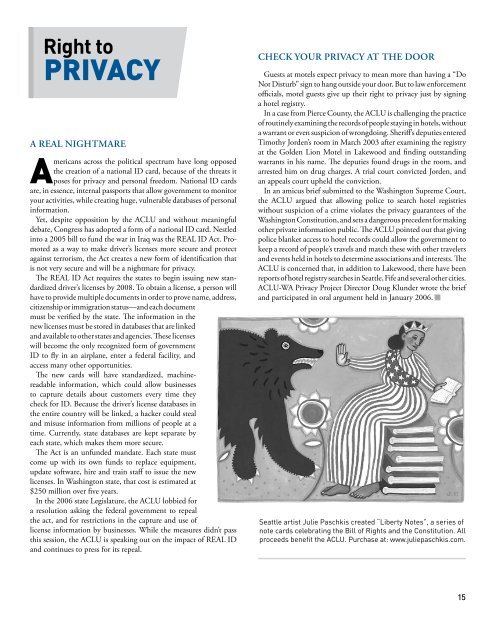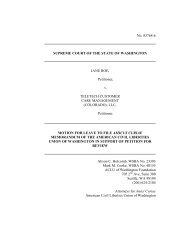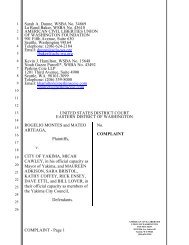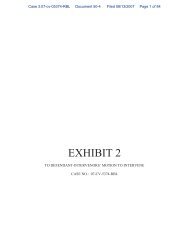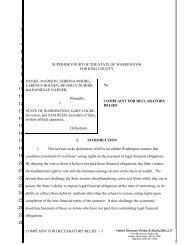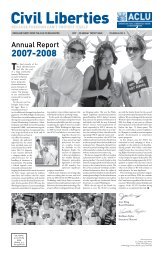ACLU-WA 2005-06 Annual Report - ACLU of Washington
ACLU-WA 2005-06 Annual Report - ACLU of Washington
ACLU-WA 2005-06 Annual Report - ACLU of Washington
You also want an ePaper? Increase the reach of your titles
YUMPU automatically turns print PDFs into web optimized ePapers that Google loves.
Right to<br />
PRIVACY<br />
A REAL NIGHTMARE<br />
Americans across the political spectrum have long opposed<br />
the creation <strong>of</strong> a national ID card, because <strong>of</strong> the threats it<br />
poses for privacy and personal freedom. National ID cards<br />
are, in essence, internal passports that allow government to monitor<br />
your activities, while creating huge, vulnerable databases <strong>of</strong> personal<br />
information.<br />
Yet, despite opposition by the <strong>ACLU</strong> and without meaningful<br />
debate, Congress has adopted a form <strong>of</strong> a national ID card. Nestled<br />
into a <strong>2005</strong> bill to fund the war in Iraq was the REAL ID Act. Promoted<br />
as a way to make driver’s licenses more secure and protect<br />
against terrorism, the Act creates a new form <strong>of</strong> identification that<br />
is not very secure and will be a nightmare for privacy.<br />
The REAL ID Act requires the states to begin issuing new standardized<br />
driver’s licenses by 2008. To obtain a license, a person will<br />
have to provide multiple documents in order to prove name, address,<br />
citizenship or immigration status—and each document<br />
must be verified by the state. The information in the<br />
new licenses must be stored in databases that are linked<br />
and available to other states and agencies. These licenses<br />
will become the only recognized form <strong>of</strong> government<br />
ID to fly in an airplane, enter a federal facility, and<br />
access many other opportunities.<br />
The new cards will have standardized, machinereadable<br />
information, which could allow businesses<br />
to capture details about customers every time they<br />
check for ID. Because the driver’s license databases in<br />
the entire country will be linked, a hacker could steal<br />
and misuse information from millions <strong>of</strong> people at a<br />
time. Currently, state databases are kept separate by<br />
each state, which makes them more secure.<br />
The Act is an unfunded mandate. Each state must<br />
come up with its own funds to replace equipment,<br />
update s<strong>of</strong>tware, hire and train staff to issue the new<br />
licenses. In <strong>Washington</strong> state, that cost is estimated at<br />
$250 million over five years.<br />
In the 20<strong>06</strong> state Legislature, the <strong>ACLU</strong> lobbied for<br />
a resolution asking the federal government to repeal<br />
the act, and for restrictions in the capture and use <strong>of</strong><br />
license information by businesses. While the measures didn’t pass<br />
this session, the <strong>ACLU</strong> is speaking out on the impact <strong>of</strong> REAL ID<br />
and continues to press for its repeal.<br />
CHECK YOUR PRIVACY AT THE DOOR<br />
Guests at motels expect privacy to mean more than having a “Do<br />
Not Disturb” sign to hang outside your door. But to law enforcement<br />
<strong>of</strong>ficials, motel guests give up their right to privacy just by signing<br />
a hotel registry.<br />
In a case from Pierce County, the <strong>ACLU</strong> is challenging the practice<br />
<strong>of</strong> routinely examining the records <strong>of</strong> people staying in hotels, without<br />
a warrant or even suspicion <strong>of</strong> wrongdoing. Sheriff’s deputies entered<br />
Timothy Jorden’s room in March 2003 after examining the registry<br />
at the Golden Lion Motel in Lakewood and finding outstanding<br />
warrants in his name. The deputies found drugs in the room, and<br />
arrested him on drug charges. A trial court convicted Jorden, and<br />
an appeals court upheld the conviction.<br />
In an amicus brief submitted to the <strong>Washington</strong> Supreme Court,<br />
the <strong>ACLU</strong> argued that allowing police to search hotel registries<br />
without suspicion <strong>of</strong> a crime violates the privacy guarantees <strong>of</strong> the<br />
<strong>Washington</strong> Constitution, and sets a dangerous precedent for making<br />
other private information public. The <strong>ACLU</strong> pointed out that giving<br />
police blanket access to hotel records could allow the government to<br />
keep a record <strong>of</strong> people’s travels and match these with other travelers<br />
and events held in hotels to determine associations and interests. The<br />
<strong>ACLU</strong> is concerned that, in addition to Lakewood, there have been<br />
reports <strong>of</strong> hotel registry searches in Seattle, Fife and several other cities.<br />
<strong>ACLU</strong>-<strong>WA</strong> Privacy Project Director Doug Klunder wrote the brief<br />
and participated in oral argument held in January 20<strong>06</strong>.<br />
Seattle artist Julie Paschkis created “Liberty Notes”, a series <strong>of</strong><br />
note cards celebrating the Bill <strong>of</strong> Rights and the Constitution. All<br />
proceeds benefit the <strong>ACLU</strong>. Purchase at: www.juliepaschkis.com.<br />
15


